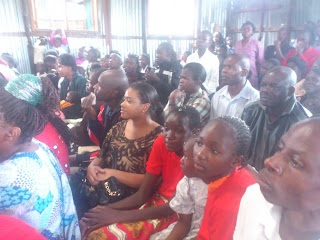My hosts, including Fr. Celestino, Fr. George, and Peter (the seminarian), greeted the wedding party upon arrival. They were met with high enthusiasm and esteem. As I followed them into the church (also constructed from metal sheets), I noticed the reverence afforded them along the way by each person they passed.
Once we entered the church, the choir began to sing. They had no musical accompaniment aside from a pair of drums, but their voices were such powerful instruments that anything more would have been a disservice. The choir was just the first indicator of the jovial wedding mass to follow.
The ceremony started with the choir clapping and singing as my hosts re-entered the church wearing green and white ceremonial clothing behind a group of dancing children dressed in either blue or red. They were followed by the wedding party (to lots of cheers). The children were amazingly joyful, and danced with such excitement it stirred the urge to dance along.
This ceremony became the first of many occasions where my hosts regarded me as a V.I.P. in front of a crowd. Towards the end of the ceremony, Fr. George told the attendees that he wanted to introduce each of his guests and called for each of us to say a few words. Fr. Celestino went first and gave me an impressive introduction, citing my academic achievements and military service. When he gave me the microphone, I thanked the newlyweds and the entire group for such a warm welcome and despite what Fr. George had joked earlier, I did not have an official message from their beloved President Obama. I also participated in the traditional cake feeding. After the bride and groom cut the cake, they feed each other. Then, they feed their best men, women, parents, and priests. Since Father Celestino insisted that I sit to his left, they fed me also.
As an aside…I cannot overstate the amount of love and adoration Kenyans have for President Obama…when Fr. George asked the crowd whether any of Obama’s cousins were in the room, everyone raised their hands and cheered. He is also referenced as their son and brother. My hosts told me there was a national holiday in Kenya the day after he was elected, with some other African nations extending their holidays for up to 3 days. Interestingly, the love for our President is solely due to his Kenyan heritage, with most residents not knowing his stance on many issues or choosing to ignore them for the sake of being proud of their son. My hosts, for instance, would not support our President as a candidate for office in Kenya. When I asked them whether they supported President Obama, they responded “We support him, as President of the United States.”
As we departed the ceremony, I thought to myself that I had never experienced such a joyous occasion. There was no Champaign, no flowers, no band, harp, or DJ. The bridesmaids dresses were safety pinned at the rear. Yet, all of the wedding participants seemed to be having the time of their lives, celebrating nuptials with two small sheet cakes and three bottles of soda. All of the wedding attendees, apart from my hosts, were residents of Kiambia.
That afternoon, Fr. Celestino gave me a tour of the city as we drove toward city center. Once in the city, we went into the office of the Pontifical Mission Society, where Fr. Celestino is the director. There, I had the privilege of meeting Bishop Peter Kihara, Bishop of both the Pontifical Mission Society of Kenya and the Catholic Diocese of Marsabit. That evening, my hosts took me to dinner at a very nice restaurant where I had a tasty spinach pizza in addition to a piece of Fr. Celestino’s barbequed goat.
































.JPG)


